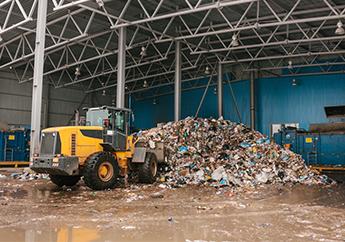
A solid waste processing facility is any facility where solid wastes are transferred from one container to another or are processed. Types of facilities include transfer stations, material recovery facilities, infectious waste facilities, solid waste incinerators and compost facilities. Activities performed at these facilities include transferring waste from one container to another, consolidating waste loads for transport, separating waste for recycling, recovering waste for sale or re-use, treating waste to kill pathogens and incinerating waste. For more information about each type of facility and a list of operating solid waste processing facilities, visit Operating Solid Waste Processing Facilities.
According to Code of State Regulations 10 CSR 80-2, companies that want to construct or operate a solid waste processing facility in Missouri are required to obtain the necessary solid waste permits. Permitting a solid waste processing facility consists of two separate permits, a construction permit and an operating permit. An operating permit is a legally binding, enforceable document that lists what solid wastes can be accepted and identify any special handling requirements. An operating permit must be obtained before the solid waste processing facility may begin accepting waste.
For a list of operating solid waste processing facilities, visit Operating Solid Waste Processing Facilities. For information about draft permits currently on public notice or public meetings and hearings scheduled for any permits under review, visit Waste and Recycling Public Notices.
Note: Some facilities or operations may be allowed an exemption to operate without a solid waste processing facility permit. Waste processing that salvages materials, sorts out items for re-use and does not generate waste to go to a landfill may not require a permit. These material processing operations must not cause any public health or environmental problems to retain its permit-exempt status. To learn more about whether an activity requires solid waste processing facility permits, visit Activities Potentially Exempt from Solid Waste Regulations
Length of Permit
The life of the facility.
Laws, Rules and Regulations
- Federal Law: Resource Conservation and Recovery Act (RCRA) - Subtitle D
- State Law: Solid Waste Management Law - sections 260.200 to 260.345, RSMo
- Code of State Regulations: Division 80 - Solid Waste Management, 10 CSR 80
- Commission, Board, Council: Missouri Solid Waste Advisory Board

